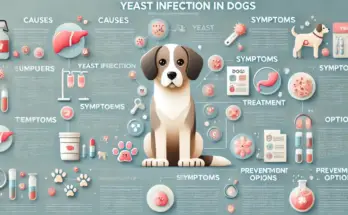Before you begin looking for the best dog food for sensitive stomachs, it’s important to first understand what might be causing your dog’s digestive issues. Just like humans, some dogs can be sensitive to certain ingredients in their food, while for others, a sensitive stomach could indicate a more serious health problem.
It’s a good idea to schedule a vet appointment to discuss the symptoms your dog is showing, whether it’s vomiting, diarrhea, soft stools, or gas. Your vet may also ask for a stool sample to check for any underlying issues or parasites. While it may seem like a lot to handle at first, working with your vet can help you save money in the long run. By identifying the root cause of your dog’s sensitive stomach, you’ll know whether it’s their food or another health concern affecting their digestion.
Why Do Dogs Have Sensitive Stomachs?
Once serious conditions like stomach cancer are ruled out, it’s time to explore other reasons for your dog’s sensitive stomach. Many dogs struggle with certain food ingredients, especially proteins like chicken or beef, which they may be sensitive or allergic to.
Another factor could be a lack of essential nutrients, such as fiber, vitamins, or minerals, in their diet. On the flip side, too much fat can also upset their tummy. It’s also important to consider that the problem might not be with the dog food at all. If your dog tends to get into the trash or snacks on table scraps, these could be contributing to their sensitive stomach.

Signs Your Dog May Have a Sensitive Stomach
The term “sensitive stomach” typically refers to mild digestive issues in dogs.
Common symptoms of a sensitive stomach in dogs include:
- Occasional vomiting
- Loose stools
- Flatulence
Your dog may experience one or all of these symptoms. If any of these symptoms are severe, it’s important to consult your vet as soon as possible. Vomiting, diarrhea, and even gas can be signs of more serious health problems that require immediate veterinary care.
How to Use an Elimination Diet for Sensitive Dogs
A possible cause of your dog’s sensitive stomach could be their diet. To figure out what’s causing the issues, you can try different types of food designed for dogs with sensitive stomachs and see which one helps reduce or eliminate their symptoms.
Figuring out if their food is the problem is straightforward, but it will require some consistency on your part. Work with your vet and start by removing any food items from your dog’s diet, other than their regular dog food. This includes table scraps, treats, and anything else they might eat during the day.
Keep a close eye on your dog to make sure they aren’t sneaking into the trash (both indoors and outdoors), the recycling bin, the cat’s litter box, the compost pile, or any hidden food sources like the garden or chicken coop. If your dog’s stomach issues persist after a few days of only feeding their dog food, and you’re sure they’re not eating anything else, it’s time to take a closer look at the food you’re providing.
What Ingredients in Dog Food Can Cause Digestive Problems?
Dog food is designed to be complete and balanced, containing a variety of nutrients like proteins, fats, grains, vitamins, minerals, and even vegetables and fruits. However, some of these ingredients can cause sensitivities in certain dogs. Understanding which components might trigger stomach issues is key to choosing the right food for your dog’s sensitive stomach.
Food-related causes of sensitive stomachs in dogs can stem from several factors, including:
- The type of protein used in their food
- The source of fiber
- The fat content in their diet
- The balance of vitamins and minerals
- The overall quality of the ingredients used
Each of these factors can contribute to digestive issues, so it’s important to choose food carefully when dealing with a sensitive stomach.

Protein
Some dogs may have trouble digesting certain proteins. For example, if your dog’s food uses chicken as the main protein source, it might help to talk to your vet about switching to a food with a different protein, like beef, lamb, or fish. This food trial can help determine if a change in protein resolves your dog’s sensitive stomach issues. During this trial, make sure to avoid feeding your dog treats or table scraps, as they can interfere with the results.
Fiber
Some dogs benefit from extra fiber in their diet. According to the Merck Veterinary Manual, beet pulp is a great source of fiber, as it helps improve stool quality without impacting nutrient digestion. Other good fiber sources found in commercial dog food include inulin and psyllium. If you think your dog could benefit from more fiber, consult your vet about adding it to their current diet or switching to a high-fiber formula specifically designed for dogs.
Fat
Dog food diets that are high in fat can be harder for some dogs to digest compared to those with more protein or carbohydrates. To check if your dog’s food is too high in fat, look at the ingredient label. If fats and oils are listed among the first four ingredients, it may be too rich for your dog’s digestive system. Work with your vet to compare your current food with other options that are lower in fat. The crude fat percentage will be listed in the “Guaranteed Analysis” section of the dog food label.
Essential Vitamins and Minerals for Dogs
Commercial dog foods that meet AAFCO standards are designed to provide the minimum required amounts of vitamins and minerals to keep your dog healthy. However, if you’re feeding a specialty diet like raw or home-cooked meals, or if the food you’re using isn’t tailored to your dog’s life stage (puppy, adult, etc.), your dog may not be getting the right balance of nutrients. It’s a good idea to consult your vet to ensure your dog is receiving all the essential nutrients for their health and digestion and adjust their diet if necessary.
The Importance of Quality Ingredients in Dog Food
Determining the quality of ingredients in dog food can be challenging. The ingredient labels on dog food don’t include details about the quality or grade of each ingredient, so dog owners need to assess quality based on factors like the food’s price, the brand’s reputation, published information, and advice from veterinarians. In 2023, AAFCO introduced guidelines for labeling dog food as “human grade,” but ingredient quality still isn’t directly stated on the label.
One way to evaluate ingredient quality is by checking if the brand conducts feeding trials. Choose a dog food brand that has performed well in trials and don’t hesitate to reach out to the manufacturer for more information. Keep in mind that feeding trials aren’t the only way to meet AAFCO standards—nutritional analysis is another method.
Newer dog food brands may not have many clinical studies yet, as these trials take time. This doesn’t necessarily mean the food isn’t of good quality, but it’s a good idea to check if the company has a board-certified veterinary nutritionist on staff. This shows they understand dog nutrition and can create products that meet the requirements.

How to Choose High-Quality Dog Food for Sensitive Stomachs
When it comes to choosing the best dog food for sensitive digestion, it’s important to rely on solid research rather than just opinions. Navigating forums, blogs, and social media can be overwhelming, as everyone has their ideas about what works best for dogs. Even the information on dog food company websites can sometimes be misleading. The best place to start is by consulting your vet or a veterinary nutritionist.
If you haven’t yet discussed your dog’s sensitive stomach with your vet, that’s the first step. It’s crucial to rule out any serious health conditions before experimenting with different foods. Your vet may recommend a few trusted dog food brands and help you identify problematic ingredients and important nutritional factors for your dog’s diet.
While it’s always a good idea to do your research, focus on articles and studies by veterinarians or certified veterinary nutritionists. They’re the true experts in dog nutrition! Be cautious when reading about miracle diets that sound too good to be true—they may not have the scientific backing to support their claims.
Best Dog Food Brands for Sensitive Digestion
Commercial dog food diets are often the most convenient and effective option for dogs with sensitive stomachs. With a wide range of formulas available, you can find food that suits your pet’s needs without irritating their digestive system. However, the sheer number of options can be overwhelming.
Some popular sensitive stomach dog food brands include Purina Pro Plan Sensitive Skin & Stomach and Royal Canin Digestive Care. These formulas are specifically designed to support digestion and promote overall stomach health in dogs.
Understanding “Complete and Balanced” Dog Food
The first thing to check when choosing dog food is whether it’s labeled as “complete and balanced.” This indicates that the food contains all the essential nutrients required for your dog’s health. Opting for a complete and balanced diet helps prevent sensitive stomachs caused by nutritional deficiencies and ensures your dog gets the right nutrition for healthy digestion.
How to Analyze Dog Food Labels
When choosing the right dog food for your pet, make sure to carefully read the label. Check the sources of protein and fiber, as well as the fat content. It’s also important to ensure you’re selecting the right food for your dog’s life stage and to stay informed about any pet food recalls by consulting with your vet.
Finding the best food for your dog’s sensitive stomach might take some time. You may need to try different foods, brands, or formulas before you discover the one that works best. While it may be tempting to switch your dog to a new food right away, it’s crucial to transition slowly. A sudden change can upset your dog’s stomach further or cause them to refuse the new food altogether.

Gradually Switching Your Dog to a New Food
The best way to switch your dog to a new food is to start gradually. For the first meal, use about 80-90 percent of the old food and 10-20 percent of the new food. Over the next 10 days, slowly adjust the ratio, increasing the new food while decreasing the old. If you’re unsure, consult your vet for their advice on the best transition method for your pet.
Homemade Recipes for Dogs with Sensitive Stomachs
A simple homemade meal can be beneficial for any dog, especially when they’re feeling under the weather. A basic dish of cooked chicken and boiled rice, free of seasoning or fat, can help soothe an upset stomach or ease diarrhea. More pet owners are turning to homemade diets for all of their dog’s meals, and this can be a great choice for dogs with sensitive stomachs.
However, it’s essential to ensure these meals meet all of your dog’s nutritional needs, which can be tricky. It’s best to consult with your veterinarian or a veterinary nutritionist to make sure your dog’s diet is balanced. Websites like Balance IT, created by Dr. Sean J. Delaney, are valuable resources for both veterinarians and pet owners looking to create a well-rounded homemade diet.
The Role of Veterinary Prescription Diets for Dogs
Not all sensitive stomach issues can be fixed with commercial or homemade diets. If switching dog foods doesn’t solve your dog’s digestive problems, your vet may suggest a prescription dog food diet. Just as there’s no single food that works for all humans with sensitive stomachs, the same applies to dogs.
Finding the right food for your dog can take time and patience, and what worked for someone else’s dog might not work for yours. Don’t be discouraged—through trial and error, and by working closely with your vet, you’ll be able to find a diet that works for your dog’s sensitive stomach.
Conclusion
Caring for a dog with a sensitive stomach may need some extra effort, but choosing the right diet can significantly improve your pet’s quality of life. By understanding which ingredients promote digestive health and which ones to avoid, you’ll be better equipped to make the best nutritional choices for your dog.
FAQ
Q: How Often Should I Feed My Dog if They Have a Sensitive Stomach?
A: Offering smaller, more frequent meals can help ease your dog’s digestion. Aim for 2-4 smaller meals a day to prevent overloading their digestive system.
Q: Can I Switch My Dog’s Food Abruptly?
A: It’s best to transition your dog to new food gradually over 7-10 days. A sudden change in diet can cause digestive upset, so take your time with the switch.
Q: Are Grain-Free Dog Foods Better for Dogs With Sensitive Stomachs?
A: Not necessarily. While grain-free diets can benefit some dogs, others may not need this change. The key is identifying what specifically causes sensitivities, with the help of your vet.
Q: Is Homemade Dog Food Better for Dogs With Sensitive Stomachs?
A: Homemade dog food can be an excellent option for dogs with sensitive stomachs since it allows you to control the ingredients. However, it’s crucial to consult with a veterinarian to ensure the meals are nutritionally balanced and meet your dog’s needs.
Q: How Can I Tell if My Dog’s Sensitive Stomach Is Improving With a New Diet?
A: Signs of improvement include firmer stools, less vomiting or gas, and a healthier appetite. Keep a close eye on your dog and track any positive changes in their digestive health.
Q: Are There Specific Breeds More Prone to Sensitive Stomachs?
A: While any dog can develop a sensitive stomach, some breeds, like Yorkies, German Shepherds, and Labrador Retrievers, may be more prone due to genetic factors or breed-specific dietary needs.
Q: How Long Should I Try a New Diet Before Deciding if It’s Right for My Dog?
A: It’s recommended to try a new diet for at least 6-8 weeks before deciding if it’s effective. Some dogs may need more time to adjust and show positive results.
Q: Can Supplements Help Dogs With Sensitive Stomachs?
A: Yes, supplements like omega-3 fatty acids, fiber, and digestive enzymes can help support digestive health. Always check with your veterinarian before adding new supplements to your dog’s diet.




